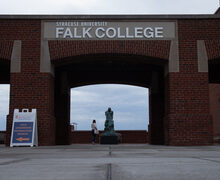Beyond the Hill : Drugged out: Wesleyan University bans Adderall on campus
Students at Wesleyan University searching for an energy boost while studying must now be wary of turning to prescription drugs.
A modification to the student code of non-academic conduct now bans the misuse or abuse of prescription drugs. The prescription drugs were banned chiefly because they violated the spirit of the student honor code, not because of concerns for health, safety or illegality, Michael Whaley, Wesleyan’s vice president for student affairs, said.
The student honor code at Wesleyan states students will complete their tests and other academic exercises ‘without improper assistance.’ The code was adjusted at the beginning of the current academic year to include the misuse of prescription drugs in the definition of improper assistance, Whaley said.
‘Some students had raised concerns about students misusing prescription drugs as study aids and felt that such misuse constituted a form of cheating,’ Whaley said. ‘It should go without saying that the misuse of prescription drugs may also present significant risk from a health perspective.’
Bradley Spahn, a senior at Wesleyan, opposed the use of study aids and campaigned to get the ban put in place, Inside Higher Education reported on Oct. 13.
Spahn could not be reached for comment by The Daily Orange, but said in the Inside Higher Education article that drug usage is particularly common at Wesleyan within the most academically challenging majors.
‘Study drugs aren’t thought of as being as serious as plagiarism or traditional forms of cheating,’ Spahn said in the article. ‘Study drugs are tacitly accepted, but with a lot of variability of student opinion on whether it’s right or wrong.’
The policy against the misuse of prescription drugs was not the only change in the honor code and code of non-academic conduct at Wesleyan, Whaley said. The university also updated other aspects of the honor code, including adding plagiarism from Internet sources, because the Internet did not exist the last time the code was revised, Whaley said.
Whaley said although enforcing the prescription drug ban will be a challenge, it is still important for the university to have clear expectations of student behavior.
‘As a community, we feel that integrity in our academic work is crucial,’ Whaley said. ‘We therefore felt that it was important to address this issue in our policy and set a clear expectation for adhering to our codes of conduct.’
Whaley said the misuse of prescription drugs is uncommon among Wesleyan students, and initial survey data at Wesleyan indicates a very small number of students misusing or abusing prescription drugs.
‘We have no reason to believe that the misuse of prescription drugs has increased at Wesleyan, but national survey data seems to indicate that such misuse is becoming a concern nationally,’ Whaley said.
Common drugs used as study aids among college students are Adderall and Ritalin, according to a December 2008 study published by the Journal of Attention Disorders.
The study of about 3,400 students at Duke University and the University of North Carolina at Greensboro found about 94 percent of students who reported using non-prescribed ADHD medications did so to study for longer and to concentrate better, according to the study.
Arya Alizadeh, the academic affairs committee chair of the Wesleyan Student Assembly, said drugs as study aids are not a huge issue at Wesleyan, but there was an instance a few years ago when a couple students were caught using study aids to gain an advantage.
‘All students at Wesleyan sign the honor code saying they won’t participate in any cheating, and I think a lot of students really take it to heart,’ Alizadeh said.
Alizadeh said most of the students at Wesleyan reacted positively to the new ban.
‘When it’s an issue that’s academically beneficial to everyone involved, I think students really rally around it,’ he said. ‘We are here as a community, and you don’t want to let your friends get involved in the misuse of prescription drugs, and you also don’t want to be competing against students who are misusing prescription drugs.’
Joseph O’Donnell, the student affairs committee chair for WSA, said many universities already have language against prescription drug abuse in their codes of conduct.
At Wesleyan, O’Donnell said the ban was not a significant policy change.
‘Since the misuse of prescription drugs, like selling them or giving them to a friend, is already prohibited by most federal and state law,’ O’Donnell said, ‘the addition was more a clarification than a change of procedure.’
Published on October 26, 2010 at 12:00 pm
Contact Meghin: [email protected] | @meghinwithani




